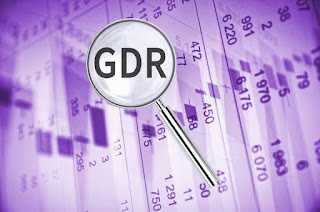Global Depositary Receipt (GDR)
A Global Depositary Receipt (GDR) is a financial instrument that enables a business to generate cash by offering its shares to investors outside of its place of origin. Comparable to ADRs, but with a wider worldwide reach, are GDRs.
Companies can raise money using GDRs in a variety of international marketplaces, usually outside of the United States. They are frequently listed on stock exchanges such as the Luxembourg Stock Exchange and the London Stock Exchange.
GDRs can be denominated in different currencies (such as U.S. dollars or euros), depending on the market where they are issued and traded.
A depositary bank, which owns the underlying shares of a corporation in its home nation, issues a GDR. Foreign investors are able to purchase the GDRs that the bank issues in place of those shares.
Many companies use GDRs for dual listings, making their shares accessible in both their home country and international markets. This increases liquidity and access to capital.
Similar to ADRs, GDR holders receive dividends and other corporate actions in the GDR's currency, which is typically converted by the depositary bank.
Key points
- GDRs can be denominated in different currencies (such as U.S. dollars or euros), depending on the market where they are issued and traded.
- GDRs enable companies to raise funds in multiple foreign markets, typically outside the U.S. They are commonly listed on exchanges like the London Stock Exchange or Luxembourg Stock Exchange.
- Depositary banks, which own the underlying shares of a corporation in their native country, are the ones who issue GDRs. Foreign investors are able to purchase GDRs, which are issued by the bank and reflect those shares.
- Similar to ADRs, GDR holders receive dividends and other corporate actions in the currency of the GDR, which is usually converted by the depositary bank.
- Many companies use GDRs for dual listings, making their shares accessible in both their home country and international markets. This increases liquidity and access to capital.
Example of GDR
Company:
Indian IT services provider Infosys.
Infosys issues GDRs through a depositary bank that maintains its ownership of the company's shares in India.
Trading:
European investors can purchase Infosys GDRs without having to trade on the Indian stock exchange because they are listed on the London Stock Exchange.
Currency:
Depending on the listing, the GDRs are exchanged for either euros or US dollars.
Some key types of GDR
Rule 144A GDRs (Restricted GDRs):
Selling stocks to Qualified Institutional Buyers (QIBs) in the United States is one way that overseas firms can raise capital without having to register fully with the SEC.
These securities are known as 144A GDRs, or Global Depositary Receipts, which are issued under Rule 144A of the U.S. stocks Act of 1933.
These GDRs are privately put, only available to a limited number of institutional investors, and are not traded openly.
Sponsored GDRs :
In a sponsored GDR, the issuing company works directly with the depositary bank to create and manage the GDRs.
To improve transparency for investors, the corporation discloses financial information. Major international markets like the London Stock Exchange and the Luxembourg Stock Exchange are usually where Sponsored GDRs are listed.
Both the domestic laws and the international exchanges where these GDRs are traded are followed by these GDRs.
Unsponsored GDRs :
Unsponsored GDRs are issued by a depositary bank without the direct involvement of the foreign company.
Unsponsored GDRs may be issued by several depositary banks for the same business, possibly resulting in several GDR iterations.Unsponsored GDRs may offer scant financial disclosures and information because the issuing business is not involved in the transaction.Regulatory restrictions for these GDRs can be lower than those for sponsored GDRs.
Regulation S GDRs
A Regulation S GDR is a type of Global Depositary Receipt issued under Regulation S of the U.S. Securities Act of 1933. It allows foreign companies to raise capital in international markets by issuing securities to non-U.S. investors without having to register with the U.S. Securities and Exchange Commission (SEC).
These GDRs are typically listed on foreign exchanges and can be re-sold to U.S. investors after a certain period.
Regulation S GDRs offer companies the opportunity to access global capital quickly and efficiently, with fewer regulatory burdens, but they come with restrictions on U.S. investor participation and may have lower liquidity compared to publicly listed securities in the U.S.
In summary, a GDR is a mechanism that businesses utilise to reach out to foreign investors and get access to international capital markets. A corporation can obtain capital outside of its native market by issuing GDRs, which provide investors and the issuing company with flexibility in terms of currency and market exposure.


Comments
Post a Comment